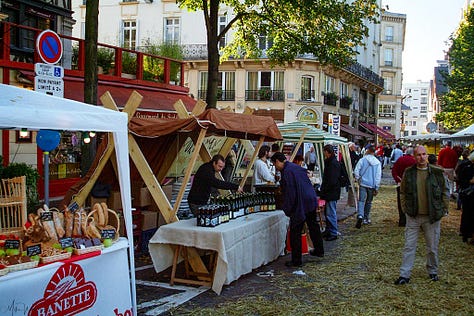
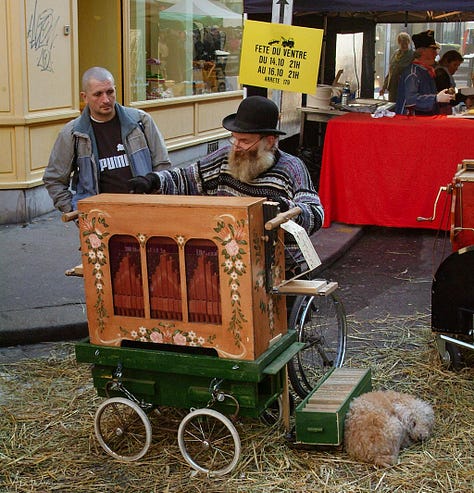
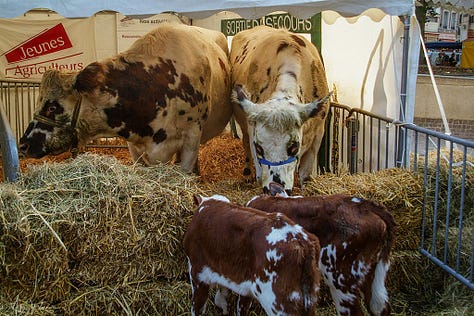
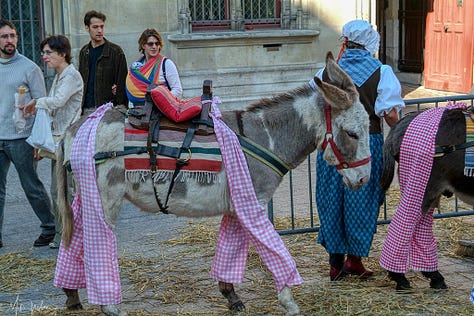
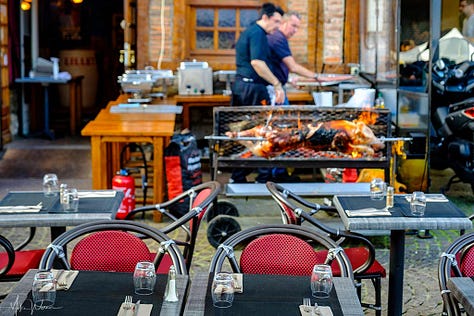
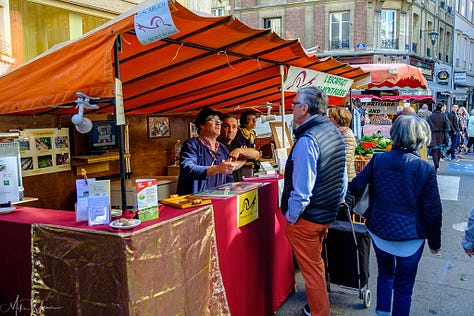
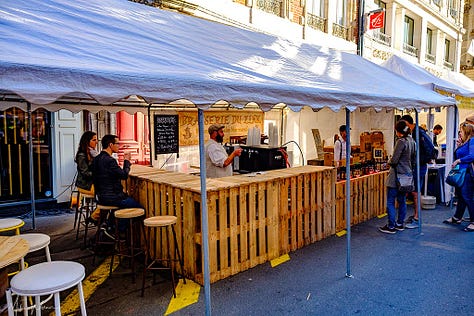
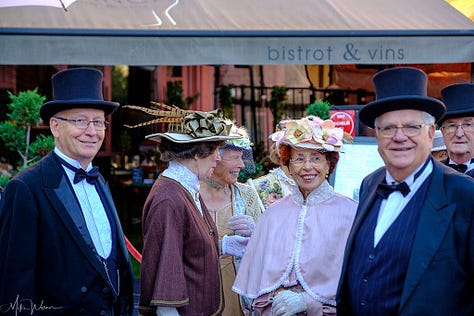
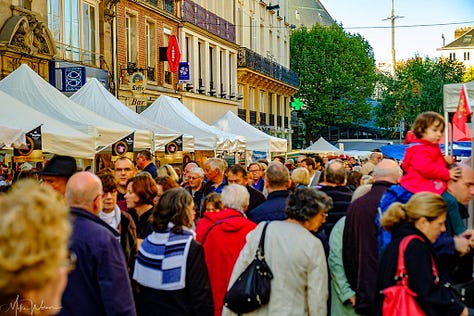
NOTE: This is Part 4 of 5 articles on the introduction of the city of Rouen. A link to the next Part will appear here when published or you can subscribe to our free newsletter and receive updates directly in your inbox.
Click here to read Part 1
Click here to read Part 2
Click here to read Part 3
Click here to read Part 5.
Culinary Scene
Rouen is also known for its culinary scene, which is an integral part of its cultural identity. Normandy cuisine, known for its use of apples, cream, and seafood, is well represented in Rouen. The city hosts a variety of restaurants ranging from traditional French bistros to contemporary eateries, offering a chance to savor local and regional specialties.
The Festival of the Stomach
La Fête du Ventre, or "The Festival of the Stomach," is a beloved culinary festival held annually in Rouen. Celebrating the rich gastronomic heritage of the region, this event draws locals and tourists alike to the historic streets of Rouen for a weekend of indulgence in traditional Norman food and drink.
The festival typically takes place in October and is a vibrant showcase of local producers, farmers, and artisans. The streets of Rouen's old town transform into an open-air market where vendors sell a wide array of local specialties. These include cheeses like Camembert, Neufchâtel, and Pont-l'Évêque; ciders and Calvados (apple brandy) from Normandy's orchards; as well as various meats, seafood, pastries, and other confections that define the region's culinary landscape.
Visitors can enjoy cooking demonstrations where chefs display their skills using local ingredients. These demonstrations often include recipes that highlight the region's produce, showing how traditional dishes are prepared. Moreover, there are tastings where you can sample the food, directly engaging with the flavors that make Norman cuisine distinctive.
The next festival is 14 and 15 October 2024.
Restaurants
Rouen has a very diverse offering of restaurants, ranging from low cost to expensive Michelin starred restaurants. Two restaurants jumps out:
La Couronne
La Couronne, located in Rouen, France, is a restaurant steeped in history and culinary tradition. It is notably recognized as the oldest inn in France, having been established in 1345. This establishment carries a significant historical aura as it is situated in the picturesque old town of Rouen, near the cathedral, which adds to its charming old-world atmosphere.
The restaurant is renowned for its classic French cuisine, with a particular emphasis on Normandy specialties. The menu often features dishes that are rich in local ingredients like seafood, apples, and cream. Signature dishes include French classics such as escargot, foie gras, and various preparations of duck and seafood, highlighting the regional flavors and culinary techniques that have been refined over centuries.
The Pressed Duck, or "Canard à la Rouennaise," is an iconic dish served at La Couronne and is a celebrated specialty in French cuisine, particularly famous in this historic restaurant. This dish is an example of haute cuisine and offers a rich, intricate taste experience that is deeply rooted in the culinary traditions of Normandy.
The preparation of Pressed Duck is an elaborate process and quite theatrical, often prepared tableside to enhance the dining experience. It starts with the duck, which is partially roasted. The breast and legs are removed and set aside, and then the remaining carcass (including the bones and internal organs) is placed in a special press. This unique device is used to squeeze out the juices from the carcass, which are then cooked with wine, liver, and spices to create a rich, intensely flavored sauce.
The duck breasts are then sliced and served with this sauce, which is thick, rich, and deeply flavored, showcasing a profound depth of flavor that is both luxurious and comforting. This dish is a true representation of the culinary arts and historical cooking techniques, making it a must-try for those visiting La Couronne, particularly for those interested in the heritage of French gastronomy.
La Couronne gained international fame when the American chef Julia Child visited in 1948, marking her first meal in France. This experience was profoundly influential for Child and is famously recounted in her memoirs and biographies. Her meal there, which included oysters, sole meunière, and fine wine, is credited with inspiring her lifelong passion for French cuisine and her subsequent career as a chef and television personality.
The restaurant's interior maintains a traditional aesthetic, with exposed beams, antique furnishings, and decor that reflects its historic significance. Dining at La Couronne is often described as a step back in time, offering not just a meal but an experience that captures the essence of historical French dining culture. The ambiance, combined with attentive service, makes it a sought-after destination for both locals and tourists who are eager to experience a piece of French history.
Overall, La Couronne represents more than just a culinary destination; it's a historical landmark that offers a tangible connection to the past, paired with an enduring commitment to French gastronomic excellence.
Dame Cakes
Another worthwhile historical restaurant (or more a Salon de The) is called Dame Cakes.
The "Dame Blanche" cake, often simply referred to as Dame Cake, is a traditional dessert that originates from Rouen and the broader Normandy region in France. It is a lesser-known specialty compared to the region's more famous dishes like Pressed Duck or Sole Meunière, but it holds a special place in local culinary tradition.
The Dame Cake is essentially a type of gâteau, or cake, typically featuring layers of almond sponge cake soaked in a rum or kirsch syrup. Between these layers, there's usually a rich filling made from buttercream or sometimes a mousse infused with more alcohol or flavored with fruits or nuts. The cake is often covered in a thin layer of marzipan or a simple dusting of powdered sugar, adding a subtle sweetness that complements the rich, moist interior.
The origins of the name "Dame Cake" are not well-documented, but it's possible that it refers to a "ladylike" delicacy or sophistication in its flavors and presentation. It can be found in local patisseries and some restaurants in Rouen, where it continues to be enjoyed by those who appreciate traditional desserts with a rich history.
This dessert represents the indulgent character of Normandy's culinary offerings, often characterized by the liberal use of cream, butter, and liqueurs—key ingredients that are abundant in the region. Enjoying a slice of Dame Cake in Rouen offers a delightful taste of local flavor and tradition, making it a must-try for those visiting the area and seeking to experience its culinary heritage.
As a salon de thé, Dame Cakes likely offers a cozy and welcoming atmosphere where visitors can enjoy a variety of teas along with cakes and other sweet treats. Given its central location on Rue Saint Romain, it's conveniently situated for anyone exploring the historic heart of Rouen.
Click here to access their website (in French only)
NOTE: This is Part 4 of 5 articles on the introduction of the city of Rouen. A link to the next Part will appear here when published or you can subscribe to our free newsletter and receive updates directly in your inbox.
Click here to read Part 1
Click here to read Part 2
Click here to read Part 3
Click here to read Part 5.





